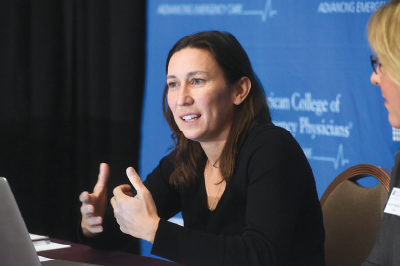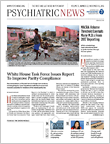Extended boarding time for psychiatric patients in emergency departments not only delays care for them but ties up beds for any new incoming patients, according to two papers presented at the American College of Emergency Physicians annual meeting in Las Vegas last month.
Patients with bipolar disorder, psychosis, major depression, dual diagnosis, or multiple psychiatric illnesses more often require a higher level of care compared with general medical patients, reported Suzanne Lippert, M.D., M.S., a clinical assistant professor of emergency medicine at Stanford University.
However, said Lippert, “our finding that the most seriously ill patients had increased odds of ED lengths of stay greater than 24 hours, even when ultimately discharged, demonstrates unacceptable conditions, in which patients are held and do not receive essential psychiatric care.”
The reports are “incredibly helpful,” said Jack Rozel, M.D., M.S.L., an assistant professor of psychiatry at the University of Pittsburgh and president-elect of the American Association of Emergency Psychiatry. “Dr. Lippert has managed to quantify a huge problem that involves length-of-stay of people awaiting a clinical decision and where they go next after that decision.”
Lippert and colleagues drew on data from 2001 to 2011 using the National Hospital Ambulatory Medical Care Survey. The survey covered about 65 million emergency department psychiatric visits, about 6 percent of the total. Whether admitted, discharged, or transferred to higher levels of care, about 23 percent of psychiatric patients required at least a six-hour length of stay versus 10 percent for medical patients. Stays of longer than 24 hours were recorded by 1.3 percent of psychiatric patients, compared to 0.5 percent of general medical patients.
Insufficient inpatient beds coupled with too few accessible outpatient places has led to “a growing crisis of unmet psychiatric needs,” said Lippert.
In addition, crisis services intermediate between hospital admission and discharge to the community are lacking as well, said Rozel in an interview. “That leads emergency physicians to err on the side of caution and admit patients, which leads to overuse of services and more access problems.”
All emergency patients, regardless of diagnosis, are affected as beds fill up with patients who should move to other settings, said Lippert.
“It’s hard to begin recovery lying on a gurney in a busy ER,” said Rozel. “It’s a tough way to get better, which is why so many people with serious mental illness are leery about going there.”
Furthermore, because of a shortage of psychiatrists, mental health care in the ED is provided by psychologists or social workers who may consult with a psychiatrist only by phone.
“There is no requirement to have a psychiatrist on call,” said Renee Hsia, M.D., M.Sc., a professor of emergency medicine at the University of California, San Francisco, School of Medicine. “In a market-driven health care system, there is a disincentive to provide low-paying care” such as psychiatry.
Extended boarding creates problems for all patients, said Hsia. When emergency departments are full, new patients are diverted to other hospitals, delaying treatment.
Boarding times appeared to vary depending on disposition, wrote Hsia and two colleagues in the September 2016 Health Affairs.
“Psychiatric patients who visited the ED were transferred to another facility at six times the rate of nonpsychiatric patients,” they wrote. “Median lengths of stay were similar for psychiatric and nonpsychiatric patients among those who were admitted to the hospital (264 versus 269 minutes) but significantly different for those who were admitted for observation (355 versus 279 minutes), transferred (312 versus 195 minutes), or discharged (189 versus 144 minutes.”
Median length-of-stay differences narrowed over the course of the study, but not for the most severely ill patients—those falling into the 90th-percentile length of stay and who were admitted for observation, they wrote.
“We need collaboration with emergency physicians, nurses, social workers, and law enforcement,” said Rozel. “Many of these patients rely on primary care as the site for their mental health care, which is why integrated care is so important.”
Potential points for improving care and disposition of psychiatric patients in emergency departments might be revealed with a better understanding of the use of involuntary holds, the availability of emergency psychiatric consultants, and available outpatient resources, concluded Lippert. ■
An abstract of “Emergency Department Length of Stay for Psychiatric Visits Was Signifi-cantly Longer Than for Nonpsychiatric Visits, 2002–11” by Hsia and colleagues can be accessed
here. The American Association of Emergency Psychiatry’s website is
here.


